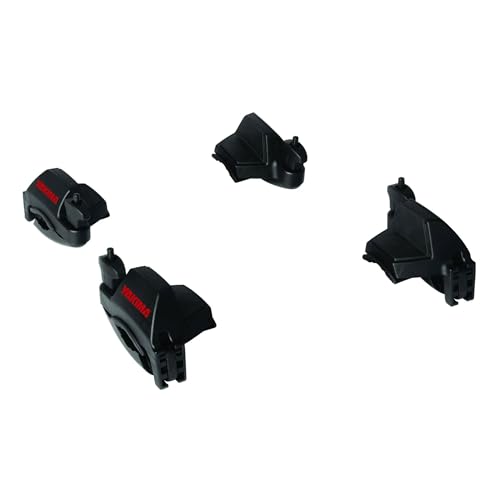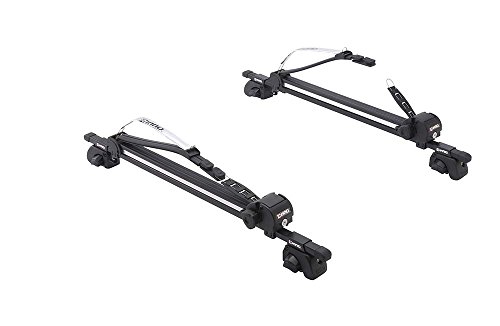Hauling a canoe can be quite the challenge; with a length of fifteen or more feet and weighing over 75 lb, it’s hard to even get it to the put-in point. Putting the canoe on top of your car and driving at highway speeds is a whole other ballgame, so it pays to have a well-made rooftop carrier if you don’t want it flying off in the middle trip.
So what’s the best canoe roof rack carrier? For most paddlers, the Malone Big Foot is going to be an excellent choice; it’s relatively inexpensive, doesn’t take up a lot of space in storage, will keep a hold of your canoe, and is not difficult to set up. While other carriers might perform better in specific situations, this is the best all-around rack.
Most rooftop carriers utilize a similar design, so you’ll need an in-depth look at each of their features to see the differences. Fortunately, I’ve done the research and have come up with some helpful reviews to assist you in the buying experience.
Last update on 2026-02-08 / Affiliate links / Images from Amazon Product Advertising API
Reviews of the Best Canoe Roof Rack Carriers
1. Malone Big Foot Pro Universal Car Rack Canoe Carrier
No products found.
Thule and Yakima were the biggest players in the rooftop carrier market for many years, enforcing a duopoly with products that would only fit their own company’s crossbars. Malone was one of the first companies to successfully produce carriers that would fit on Yakima, Thule, or any other crossbar shape, and do it at a much lower price point than the Big Two.
This Big Foot carrier uses four L-shaped brackets, two on each crossbar, along with two ratchet straps to hold your canoe securely in place. It’s an exceedingly simple design that works well and is a big step up from the foam blocks that many canoe paddlers use to mount their boats, as it’s much easier to load. When not in use, they cause minimal wind resistance when mounted to crossbars and take up very little storage space in your gear closet.
However, while Malone says that the Big Foot will fit just about any type of roof rack and it does an exceptionally good job of mounting on crossbars of various shapes, it doesn’t fit all racks equally well. Some users require longer bolts as their crossbars are too thick, while others find that their crossbars aren’t wide enough to fit their canoe between the padded brackets.
They can also produce an irritating howl when there’s no canoe attached to them; something to think about if you like to leave your carrier mounted all the time.
For the most part, the Big Foot fulfills its purpose exceptionally well, mounting to most crossbar setups and fitting most canoes. It’s quite a bit less expensive than the carriers sold by the Big Two, making it a great choice for budget-conscious paddlers.
Pros:
- Inexpensive
- Compact and lightweight for storage
- Easy to load
Cons:
- It doesn’t fit all racks that well
- Makes a howling noise when empty
No products found.
2. Yakima Keel Over Canoe Carrier
Yakima is one of the oldest rooftop rack companies, so it should come as no surprise that one of their canoe carriers is in my top picks. Known for their quality and excellent design, this Keel Over is an incredibly durable and easy to use canoe carrier that is sure to please most paddlers.
The Keel Over uses a set of brackets that are somewhat similar to Malone’s Big Foot, but with a slightly more elegant design. Each bracket is hinged and only requires you to hand tighten one wingnut to lock them to the crossbar.
The brackets also have a piece of padding inserted between themselves and the crossbars, which gives it a tighter fit and reduces noisy vibration. While the Keel Over was certainly designed with Yakima crossbar users in mind, it’s meant to fit a variety of different shaped bars, so it’s a valid choice for just about any paddler.
So is there anything negative to say about the Keel Over? Mostly that it’s more expensive than some of the non-name brand carriers. Since Yakima doesn’t stake its name on providing a universal fit, you might find that it doesn’t work as well on non-Yakima crossbars as other carriers on the market do.
Yakima makes some great products, and if price isn’t your most important consideration, and you already have a Yakima crossbar set, the Keel Over will be your best option. You simply cannot beat the tight fit that comes with a carrier and crossbar set from the same company.
Pros:
- Padding beneath the bracket reduces vibration significantly
- Very durable
- Tightest fit if you already have a Yakima crossbar set
Cons:
- Somewhat expensive
- It doesn’t have the best “universal fit”
3. Rhino Rack Nautic 580 Canoe Carrier
Rhino Rack isn’t very well known in the rooftop carrier market, but they produce some premium models that are well-suited for customers looking for a high-quality option.
The Nautic 580 is one of the best carriers you can buy if price is not a consideration. Unlike most carriers, the brackets are not simple L-shapes, but ideally curved to cup your canoe’s hull. This helps to reduce vibration and sliding during transport. However, that tight fit means that it won’t work with all canoes, particularly some of the wider-hulled models.
Another great thing about the Nautic is that the brackets rotate out of the way, which makes it easier to load the carrier setup from the rear. Anyone who’s had to load a canoe solo known how irritating the process can be, so it’s great to see a carrier manufacturer do something to make it go more smoothly.
The Nautic also comes with lock cores for the bracket to prevent theft when your vehicle is parked out in the open. Lock cores are an add-on with Yakima racks and a few others, but they don’t come cheap.
Again, the biggest problem with a premium product like the Nautic is that it’s quite a bit more expensive than its competitors – in this case about twice as much as the Malone Big Foot. You really get what you pay for, though.
Pros:
- It provides more support than most canoe carriers
- Comes with anti-theft lock cores
- Brackets rotate out of the way for easy loading
Cons:
- More expensive than most carriers
- Unique bracket design doesn’t fit all canoes
4. Inno Locking Roof Rack Carrier
The Rhino Rack comes with a set of lock cores to prevent the carrier from being stolen, but what about the canoe itself (which is presumably more expensive)? One of the only carriers that lets you lock the canoe to your vehicle is the Inno Locking Roof Carrier.
Bike and ski racks often come with a locking mechanism to prevent theft, but since canoes and kayaks are attached with ratchet straps instead of solid plastic or metal arms, there’s rarely anything you can do to secure them.
Instead of ratchet strap, the Inno uses a pair of locking plastic and wire bands to hold your canoe tightly to the roof and prevent anyone from making off with it while you are away.
As you might expect, the Inno also comes with lock cores to prevent theft of the carrier system itself; it’s definitely the most secure system you can buy. It also has the advantage of being able to carry a variety of watersports products: canoes, kayaks, even surfboards. No need to buy a different rack for different sports.
The Inno’s security doesn’t come cheap, though, costing at least double what some of the less expensive models would. However, if you’ve ever had a boat stolen, you know it’s worth the cost.
It seems most of Inno’s innovation went into the locking system too; it just doesn’t have a good universal fit. Many users have complained about this, so you’ll need to think about whether you’re more comfortable with some rattling on the highway, or the thought of your canoe being vulnerable to theft.
Pros:
- One of the only carrier systems that locks the canoe to the roof
- Versatility – the bands can hold a canoe, kayak, or surfboard equally well
- Comes with lock cores
Cons:
- Doesn’t fit crossbars very tightly
- Expensive
5. Reese Towpower Canoe Loader
Anyone that’s carried a long canoe (17+ feet) knows how annoying it can be when the ends of your boat overhang your roof by a few feet; it just doesn’t feel stable. You can tie a rope to the bow and stern, connecting them to the frame of the vehicle, but it’s the not same as solid roof.
Fortunately, if you’re hauling your boat with a truck or SUV that has a 2-inch hitch, the Reese Towpower can provide that extra stability. The incredibly durable, steel T-bar goes out from the tow hitch by several inches and then extends up a few feet to cradle the canoe. The entire setup is adjustable to account for vehicle height.
The Towpower definitely makes for a more stable rooftop mount, but the design lends itself to lateral movement that can be pretty disconcerting. With so much material hanging off the back of the vehicle, there’s bound to be some shake. That movement is reduced when you have a boat tied to it (don’t leave it up when there’s no boat attached) but it is not eliminated completely.
You also need a roof rack and carrier system to go along with the Towpower. Your vehicle’s crossbars should have something like the Big Foot or Keel Over to keep the boat secure – this is just a third crossbar. As such, this one’s definitely a niche product, but if you’re carrying your canoe on an SUV or pickup, it could be a great addition to your paddling setup.
Pros:
- Provides extra stability for longer canoes on shorter rooflines
- Fully adjustable to fit most vehicles with a tow hitch
- Very durable design
Cons:
- Won’t work on vehicles lacking a tow hitch
- Has some lateral shake that could be annoying for nervous drivers
- Still needs a carrier for the front and rear crossbars
Choosing the Best Canoe Roof Rack Carriers – Buyer’s Guide
There’s going to be a number of ways to mount your canoe to the roof of your car and the best choice is going to be the one that feels right for your needs.
Some are complicated and expensive but can secure any size load, while others are cheap, easy to use, and only fit certain boats. It’s all about your needs when searching for the best canoe roof rack carrier.
Fitting
The first question you have to ask when purchasing a carrier is simply “does it fit”, which is actually a two-part question.
First, does it fit your existing roof rack? If you own a set of Yakima or Thule crossbars, you might want to purchase a carrier from them to make sure your carrier fits tightly.
If you’ve got a factory roof rack, what shape of crossbars does it use? Most carriers utilize a “universal” mounting system that can fit on any type of bar – Thule, Yakima, factory, round, square, doesn’t matter. These mounts may fit all crossbars, but they don’t fit them all equally well, so if you can, get one that has a mounting kit made to fit your bar shape.
The second part of “does it fit?” refers to the carrier’s ability to fit your canoe. This is less of an issue than the crossbars because you typically adjust the carrier pieces to be closer or further apart to accommodate the canoe’s width.
The problem comes when your canoe is wider or longer than the carrier can fit. Such a problem is more likely to occur if you own a canoe longer than 17 feet or one that’s wider than 36 inches.
Ease of Use
Perhaps the second most important consideration when choosing a canoe carrier (or any type of carrier for a roof rack) is how easy is it to use?
For less than $20 you can buy some cheap foam blocks and ratchet straps to mount the canoe on your roof, but using them will never be a fun experience, and there’s always a risk something will slip and your car will end up with some serious scratches in the paint.
Most carriers mount to a set of crossbars, either the ones that came with your vehicle, or via an aftermarket setup. The canoe carrier then prevents any side-to-side movement from the boat with a set of cradles or posts.
Then, a pair of straps goes over the boat and underneath the crossbars to fully secure it to the roof rack. It’s a fairly simple design, and so long as you keep the straps tight, exceptionally foolproof.
So how can one carrier be easier to use than another if the design is so simple? It mostly comes down to how much time it takes to remove the carrier from the crossbars; some can be unscrewed in a minute or less while others can take a few minutes for each carrier piece. It might not sound like much time, but it’s not something you want to fuss around with every weekend either.
Additionally, a number of carriers are designed so that they can be loaded without an extra set of hands. All you have to do is tip the bow end of the canoe into a set of cradles and slide the canoe forward. Look for a carrier of this type if you do a lot of solo paddling.
Price
Roof racks and all their accompanying accessories can run a thousand dollars or more if you’re doing multiple sports, so it’s well worth it to look for less expensive carriers, so long as performance isn’t being compromised.
Cheaper carriers are often less durable, so if you’re going to be using it dozens of times per season, it pays to invest in a high-quality carrier. Some carriers have a few extra features like a locking mechanism that can significantly raise their price. Ask yourself if these extras are really something you need before dropping the extra cash on them.
My Choice for the Best Canoe Roof Rack Carrier
There are a few excellent canoe carriers on the market right now, but it would be hard to find a better mounting system than the Malone Big Foot.
It’s simply easier to use than most models and it doesn’t cost an arm and leg either. In the off-season, it takes up minimal space in your gear closet, which is always a plus for paddlers that don’t have an entire garage to store their accessories in.
However, if you’re worried about your security, perhaps because you leave your canoe mounted to your vehicle while parked on the street, the Inno is a superb alternative. There are so few locking carriers on the market, and this model does an exceptional job, albeit at a relatively high price.
Also, if you already own a set of Yakima crossbars, it would be prudent to get the Keel Over carrier as it’s sure to fit the bars better than any universal mount.
Top Rated Canoe Roof Rack Carriers
Last update on 2025-12-04 / Affiliate links / Images from Amazon Product Advertising API










